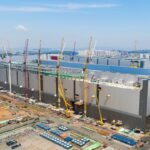
Lee Jae-yong, the CEO of Samsung Electronics, was in the Netherlands a few weeks ago to close significant business agreements with ASML, a manufacturer of semiconductor chip equipment. He accompanied the president of South Korea on a four-day formal visit, following their invitation to the Netherlands by Dutch King Willem-Alexander to discuss several semiconductor deals.
On his return to the country, the company’s CEO expressed his satisfaction regarding the business deal signed with ASML to the press. According to Lee, most of the achievements were concentrated on semiconductor chips. ASML is involved in manufacturing advanced EUV (Extreme Ultraviolet) chip-making equipment that manufactures 7nm chips or better. The value of each EUV machine is estimated to be in millions and the company has the capacity to manufacture 40–50 such machines. Given this situation, it is quite difficult for firms like Samsung and TSMC to acquire these EUV machines.
Last week, ASML and Samsung signed a KRW 1 trillion ($755 million) deal that will focus on building a new semiconductor chip research plant in South Korea. It will focus on developing EUV technologies. The vice chairman of Samsung Electronics and head of the Device Solutions Division, Kyung Kye-hyun, stressed that the company’s most recent agreements will enable it to obtain high-NA (Numerical Aperture) EUV lithography scanning equipment of the newest generation.
Reportedly, the new chip research plant will be built in Dongtan, Gyeonggi Province, South Korea. The plant will employ engineers from ASML and Samsung to work on, improve, and develop the EUV chip fabrication technology. One thing to notice here is that Samsung’s recent deal with ASML is not related to bringing 2nm chip-making equipment to the country. Rather, it focuses on a collaboration that will enable Samsung to use next-generation equipment for the best.
In the coming months, ASML will introduce the equipment used for manufacturing 2nm node chips. Chip manufacturers will be able to utilize ultrafine patterning technology for manufacturing 2nm-node chips since modern equipment will improve the light-collecting capacity from 0.33 to 0.55. The company aims to manufacture ten such machines. Of those ten machines, six have been acquired by Intel. The company intends to improve its production capacity and increase it to 20 in the coming years.
The South Korean tech giant Samsung can begin the production of 2nm chips in late 2025 once it gets the 2nm chip equipment from ASML. However, this is merely an assumption since things and plans are subject to delays due to the conditions of the market and production quality.
Research Snipers is currently covering all technology news including Google, Apple, Android, Xiaomi, Huawei, Samsung News, and More. Research Snipers has decade of experience in breaking technology news, covering latest trends in tech news, and recent developments.